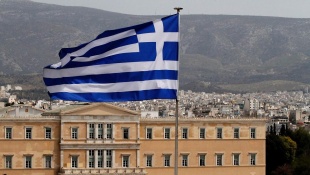Translated "Avante" article by Ângelo Alves, Member of the PCP Political Committee and of the International Department
The outcome and final contents of the Greece and European Union agreement, is a proof of the challenges the people of Greece and other peoples in Europe are to be confronted with, in the struggle for the recuperation of their rights, life conditions and the reversal of the impoverishment and social regression imposed by the great capital, the European Union and the right-wing and social-democracy governments.
If there were to be any conclusion to consider, on the so-called “negotiation” process between Greece and the European Union, which ended with a compromise between the Greek government and the “institutions”, is that what happened in reality was all but a real negotiation. Indeed, it was an unacceptable blackmail process by using the Greek fragility and dependence nurtured by the European Union policies, in order to force, in the essential, the same direction and the basic political options, which conducted Greece to the current situation. Policies that aim, essentially, to defend the great capital interests and the European great capitalist powers, along with the European Union’s domain instruments, namely the Euro.
A blackmail process in which the contempt for the people of Greece will e, legitimate desires and rights were assumed shamelessly, by the European Union institutions and the governments seated in the Eurogroup and the European Counsel, including, at our shame, the Portuguese government, placed in a subservient and Machiavelli position, as contrary to the national interest. A process that clearly proves the European solidarity and cohesion speeches are but hypocrisy and shameful exercises, empty speeches and currently run out by propaganda. A process, in which, once more, the identification of interest and options among the great capital, social democracy and the right-wing, as proved by governments roles, such as the French ( the one that was to change France and Europe and confront Mrs.Merkel) that attacked the people of Greece will and their social, labour, democratic and sovereignty rights.
By reading the agreement ‘s essence, it becomes a motif of concern, the prolonging of the tutelage regime and the imposition of the current objectives, contained in the agreement memorandum, which is in force within Greece, a fact which is a negative development contrarily for the people of Greece’s expressed desire to carry out a political change, issued in the recent elections and deviating from the expressed aspirations through social struggles, the workers and the people of Greece have exemplarily performed and fought during all these years.
One ought to say it was the possible agreement. And possibly it ought to be so. But, this is the central issue that this process has revealed and is important for the proceeding of the people’s struggle, as well as for the Portuguese people: the confrontation among the workers and peoples and the class nature of a European Union, that as reality proves, is not reformable. In reality, this confrontation is not resolvable by a sudden act, it is also true, battles, fought in its name, ought to hold a direction , a clear motive. Therefore, the PCP has stated repeatedly, that in Portugal, the development of a patriotic and left-wing policy must, inevitably, recuperate the sovereignty instruments, free Portugal from the European Union’s embarrassments, including the euro, and by mobilizing the people and its social forces in order to reject blackmailing and impositions. A policy, as reality proves, implies compulsory ruptures, which will bring upon benefits, not only for the Portuguese people, but for all peoples throughout Europe, demanding determination and transparency, having to be developed within all the classes’ struggle levels: institutional, political, social , ideological and of masses.
